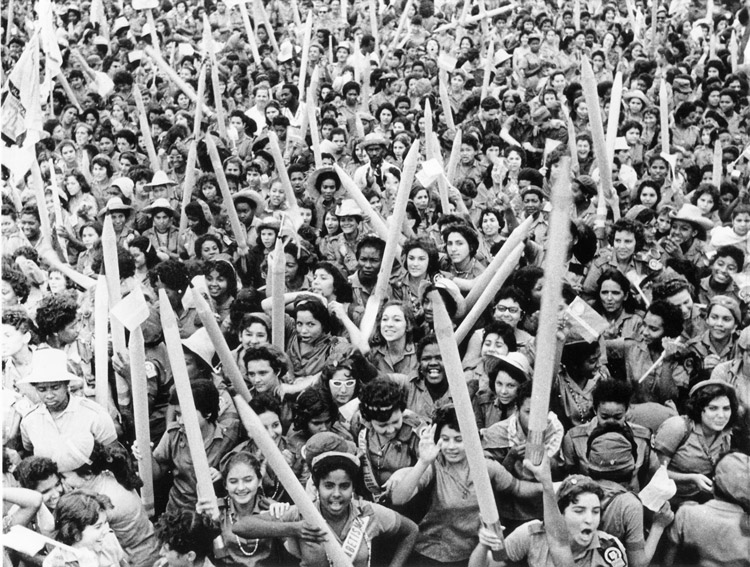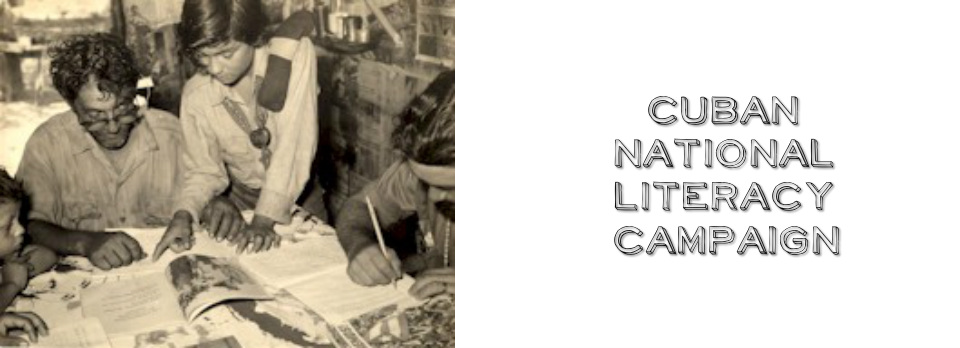Latin America
Related: About this forumCuban Teachers and Students Make the Revolution
JANUARY 6, 2023
BY W. T. WHITNEY
Schools in Cuba are places where doors opened up for all Cuban young people to learn and for students, even of oppressed classes, to prepare for one or another kind of work that would contribute to Cuba’s development as an independent nation. Cuban education has been ground zero, we suggest, for ending inequalities.
Cuban literacy teachers, 123 of them, arrived in Honduras on December 20. With Honduran colleagues, they would be utilizing Cuba’s special method “Yo se puedo” (Yes I can) to teach literacy. It’s found worldwide application.
December 22 in Cuba is “Teacher’s Day.” On that date in 1961 – Cuba’s “Year of Education” – Fidel Castro, speaking before a large crowd in Havana, announced the end of Cuba’s literacy campaign of that year. He declared Cuba to be a “Territory Free of Illiteracy.”
On hand were 100,000 young people who had volunteered to teach the rudiments of reading and writing to illiterate adults living in rural areas. These young people, mostly from Cuba’s cities, lived with families they were teaching, and did farm work.
Joining them in the island-wide literary campaign were tens of thousands of volunteer teachers, unionists, and other working people. In the end, 271,000 literacy volunteers enabled 707,000 Cubans – Cuba’s population was 7,291,200 – to learn how to read.
More:
https://www.counterpunch.org/2023/01/06/cuban-teachers-and-students-make-the-revolution/



~ ~ ~
Truthout:
Bernie Sanders Was Right About the Cuban Literacy Campaign
One of the key strengths of the Cuban campaign was to reframe illiteracy as a collective issue.
By Catherine Murphy , TRUTHOUT
Published February 28, 2020

Participants in the Cuban Literacy Campaign march in December 1961.
LIBORIO NOVAL. USED WITH PERMISSION.
The corporate media have long been looking for ways to discredit Bernie Sanders, and they settled on a surprising statement he made in the 1980s during his tenure as mayor of Burlington when he said, “We have a lot to learn from Cuba.”
Now, they have latched onto a statement he made about Cuba during an interview on “60 Minutes” after winning the Nevada caucuses: “We’re very opposed to the authoritarian nature of Cuba but you know, it’s unfair to simply say everything is bad,” Sanders said. “When Fidel Castro came into office, you know what he did? He had a massive literacy program. Is that a bad thing?”
Ironically, several years earlier, in 2016, President Obama said something quite similar, expressly celebrating Cuba’s hard-won national education system. He said:
Every child in Cuba gets a basic education. That’s a huge improvement from where it was. Medical care, the life expectancy of Cubans, is equivalent to the United States, despite it being a very poor country, because they have access to health care. That’s a huge achievement.
This followed Obama’s historic announcement, in December 2014, that the U.S. would change course from decades of hostile foreign policy toward Cuba, saying that the U.S. embargo on Cuba had not achieved its goals. Obama said that the U.S. would take steps to re-establish diplomatic relations with Cuba and embark on a path of learning to live as neighboring nations, respecting our many differences and collaborate in areas of joint interest.
Bilateral projects began to blossom in the areas of medical and social research. Official delegations from U.S. cities such as Washington, D.C., and New Orleans began to visit Cuba to explore mutual connections. Many of them visited the Havana Literacy Museum to learn about how the Cuban Literacy Campaign mobilized 250,000 volunteer teachers who taught more than 700,000 of their fellow Cubans to read and write.
More:
https://truthout.org/articles/bernie-sanders-was-right-about-the-cuban-literacy-campaign/
Judi Lynn
(160,598 posts)From 2011-2014, the Program for the International Assessment of Adult Competencies, conducted by the Organization for Economic Cooperation and Development, carried out a large-scale international assessment that set out to measure literacy, numeracy and digital problem-solving. Their results placed study participants in the lowest two categories.
Those 43 million U.S. adults with unmet literacy needs have difficulty navigating complex documents that have critical importance in their lives, such as forms related to health care and health information, getting mortgages and bank loans, and of course, voting ballots.
The mainstream U.S. narrative frames illiteracy as an individualized problem, placing blame on individuals who suffer low literacy. And they often blame themselves. But a 20 percent low literacy rate in the U.S. indicates a systemic problem that requires collective strategies toward solutions.